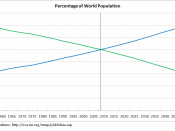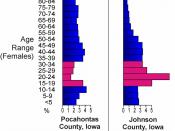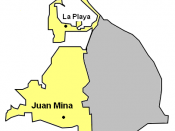The causes and consequences of rural to urban migration.
In many countries, particularly in third world countries there is a noticeable pattern of rural to urban migration. This pattern of migration is not a new phenomenon.
There are various reasons for its occurrence and these reasons may vary from country to country and over periods of time. The consequences of this type of migration however have similar results for different countries and over periods of time.
One cause of rural to urban migration may be the lack of jobs in the area. Many of the jobs available in rural areas are agricultural based. The introduction of labour saving devices and bad weather conditions has decreased the demand for labour in the agricultural sector. The decrease in the traditional form of employment in rural areas forces many young people to leave the area in search of work in the urban centers of their country.
Workers may also migrate from rural areas to urban areas in hope of gaining a higher standard of living. They may leave their current jobs in hope of finding higher paying ones as there are many more opportunities for employment to chose from in the city.
A third reason for this pattern of migration is that many people desire to expand their experiences. They may wish to be exposed to a greater variety of opportunities, people, cultures, art, food and entertainment. The variety they desire may not be as widely or conveniently available to them in their hometowns as in an urban center in their country.
War, famine and natural disaster are also reasons for rural to urban migration in some countries. Entire rural populations may migrate to the urban centers of their country in search of protection, food and medical aid during these periods of hardship.
One consequence of rural to urban migration is overcrowding. If migration takes place too quickly or unexpectedly, the planning necessary to accommodate growth will not be in place. Overcrowding leads to issues such as higher rents, traffic and pressure on resources such as schools and medical centers.
The growth in the working population will also mean more competition for jobs. This will prove advantageous to employers who can decrease salaries offered as demand for jobs may outstrip the number of jobs available. The lack of jobs may in turn lead to problems of vagrancy, prostitution and unfair treatment to the least skilled workers in the workforce.
The migration of people from rural areas to urban areas has detrimental effects on the rural economy. Some small communities may cease to exist overtime as there is no one left to run businesses, work in local companies or demand products from local firms because the younger generations of the area have migrated.
Lastly, there maybe an increase in the spread of diseases from urban to rural areas. When workers return home to visit relatives and friends they may spread illnesses and diseases they contracted while in the city. This accounts for the spread of AIDS in rural areas of many African countries.
Migration from rural to urban areas occurs for several reasons, namely in the search of a better lifestyle and standard of living. However planning is necessary to properly provide for the additional strain that a growing population will have on a city's resources. Planning may also be necessary to protect rural communities and aid their growth as a solution to the overcrowding that occurs in most urban centers in countries around the world.
![[Tree in a rural area] (LOC)](https://s.writework.com/uploads/7/74651/tree-rural-area-loc-thumb.jpg)




